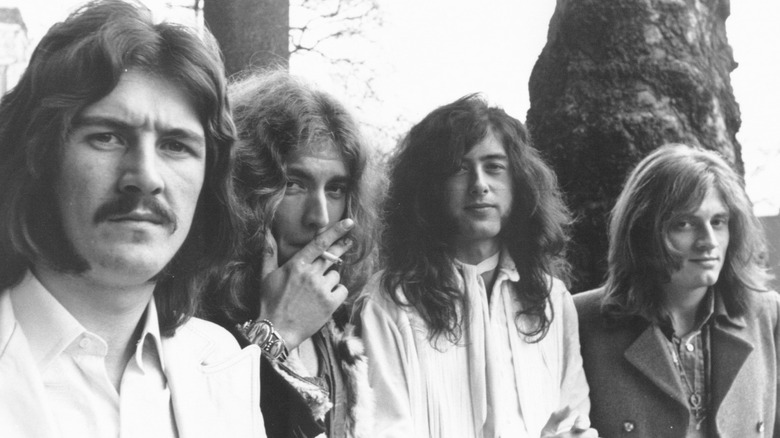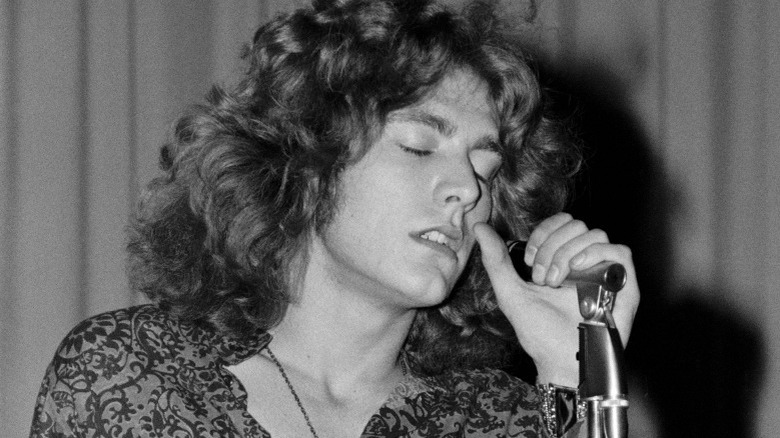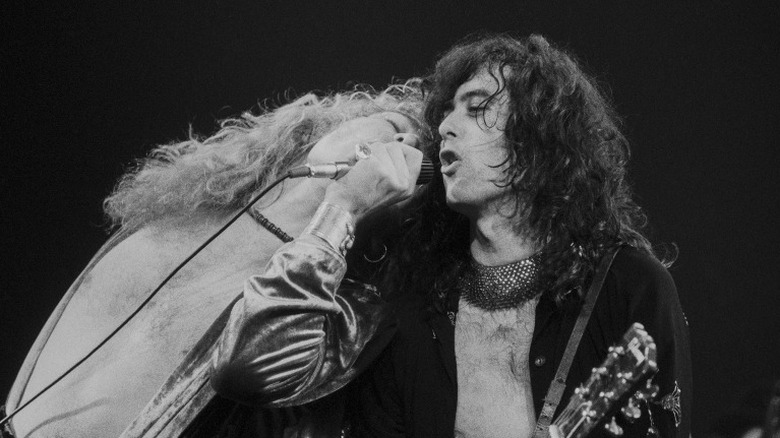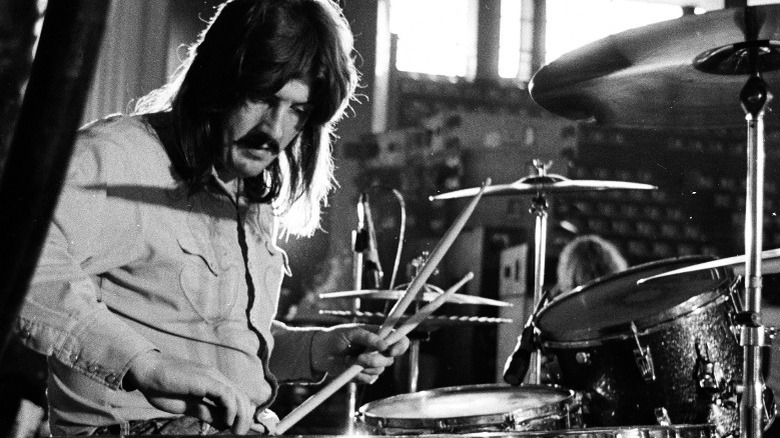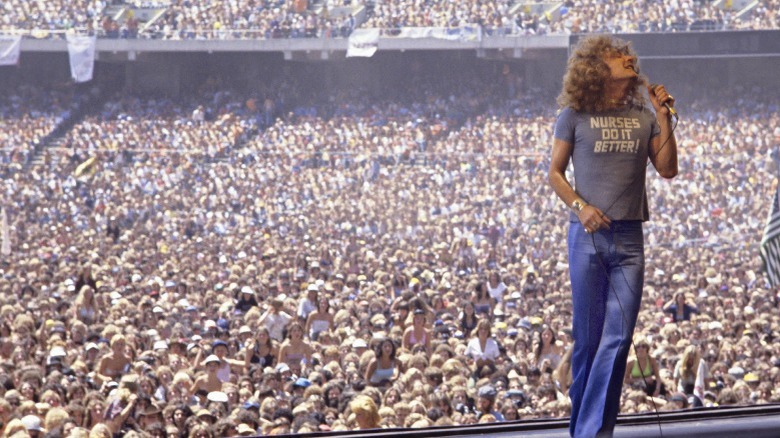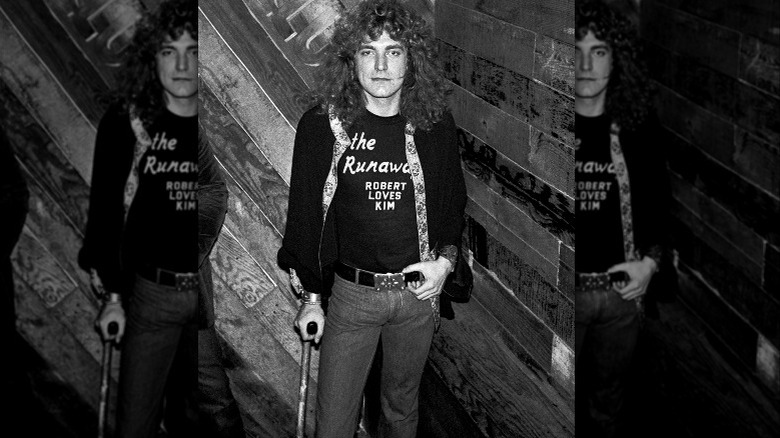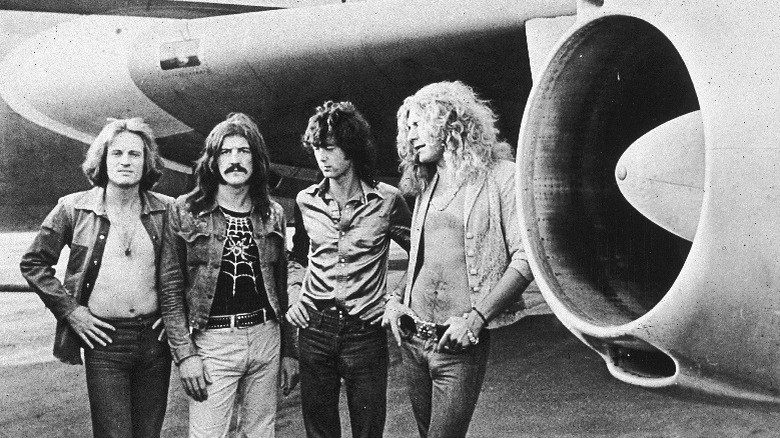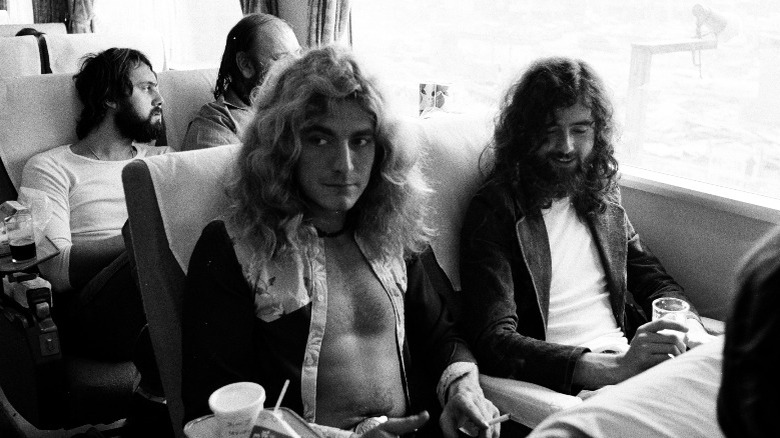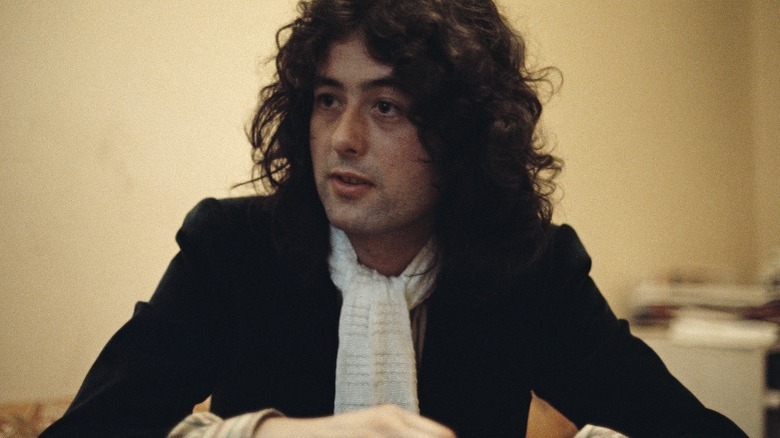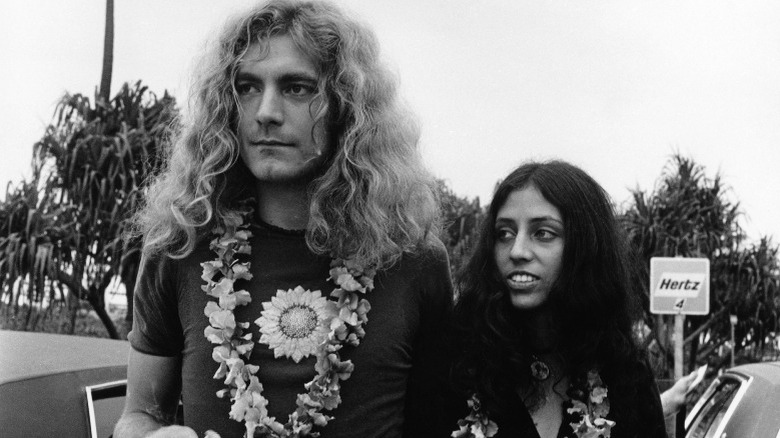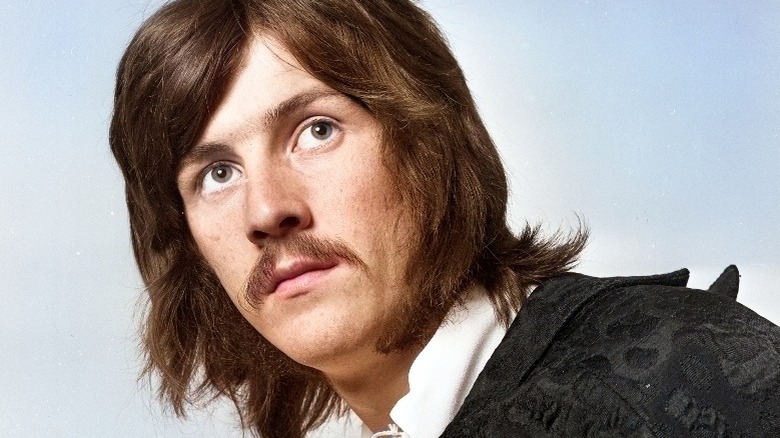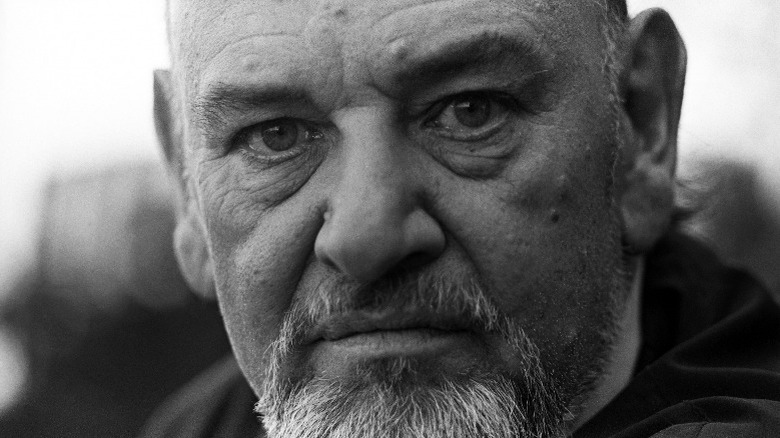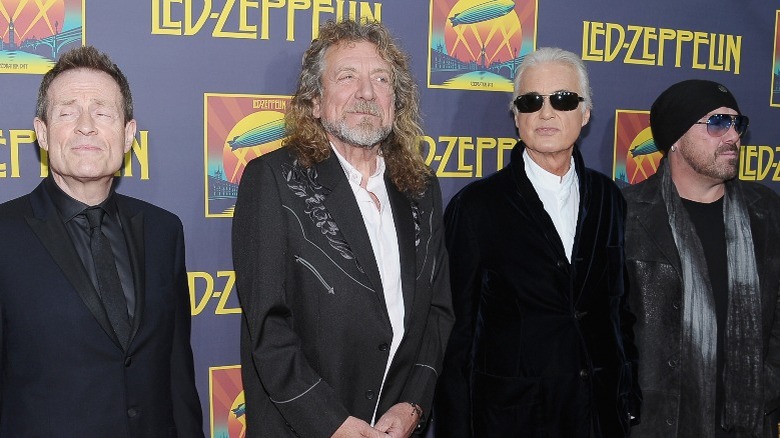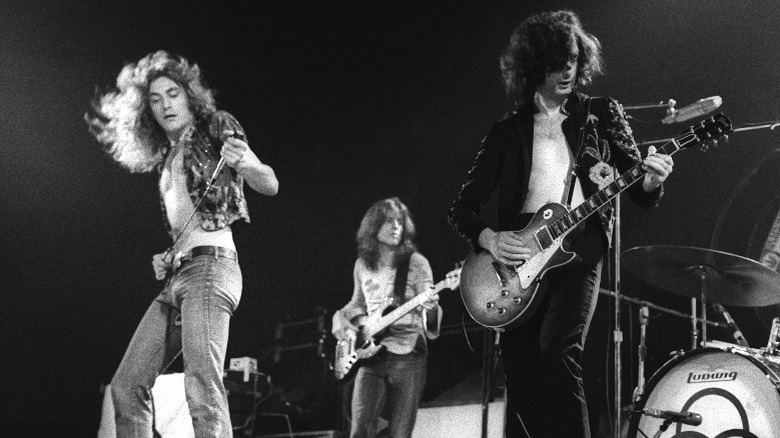Tragic Stories About Led Zeppelin
When it comes to rock music, Led Zeppelin truly brought the "Hammer of the Gods." Formed in England in 1968, the band was practically destined for greatness as both its founder, guitarist Jimmy Page, and his recruited pal, bassist and keyboardist John Paul Jones, were already accomplished session musicians. The addition of vocalist Robert Plant and drummer John Bonham — both young but well-versed in their shared local music scene — perfectly completed the ensemble.
An international sensation in the 1970s, Led Zeppelin remains one of the most successful and legendary bands in rock history, shattering records with their electrifying live shows, diverse genre-spanning catalog, patented refusal to play by the rules, and carefully cultivated air of mystique. Many Led Zeppelin songs, including "Stairway to Heaven," "Whole Lotta Love," and "Immigrant Song" — which has taken on a new life in Marvel's "Thor" movies — have proven to be enduring classics.
But, over the years, the group's touring exploits — particularly involving frequent dalliances with groupies, irresponsible partying with sea creatures, hedonistic destruction of hotel rooms, and reckless drug and alcohol use — have become a cautionary tale of rock's dark side. On top of it all, nearly everyone affiliated with the band was battling their own personal demons. In fact, a few members were plagued by so much adversity that many people believed the group was cursed. From dangerous riots to unchecked substance abuse to multiple untimely deaths, here are some tragic stories about Led Zeppelin.
The following article includes descriptions of addiction and substance misuse. If you or anyone you know needs help with addiction issues, help is available. Visit the Substance Abuse and Mental Health Services Administration website or contact SAMHSA's National Helpline at 1-800-662-HELP (4357).
Robert Plant suffered from stage fright at first
While it might seem shocking, considering that Robert Plant is now widely hailed as one of the most iconic rock frontmen of all time, the lion-maned singer once suffered from crippling self-confidence issues. Plant was still just a teen when Led Zeppelin first hit the road in 1968, and the screaming masses — and harsh media feedback — were too much for him at first.
Critics weren't kind to Led Zeppelin, and Plant, being the face and voice of the band, often took the brunt of their abuse. "I saw little more than Robert Plant's imitations of sexuality," Jon Landau wrote in Rolling Stone (via Barney Hoskyns' book "Led Zeppelin IV") after attending a 1969 show. Meanwhile, Rolling Stone's John Mendelsohn slammed his "prissy" appearance. The cruel words deeply affected Plant, who was already prone to self-doubt.
In fact, band manager Peter Grant admitted to Hoskyns that he had to hide bad reviews from him. And, as author Stephen Davis noted in his biography "Hammer of the Gods," Grant sometimes had to comfort an anxiety-wracked Plant just to get him on stage. These issues, which also made him hesitant to write lyrics, caused bandleader Jimmy Page to consider him the group's weak point. As a result, he was initially paid less than tour manager Richard Cole and wasn't credited on the band's first album. Following Led Zeppelin's 1970 tour, Cole noted in Hoskyns' book: "More than anyone, Robert seemed on the brink of collapse."
John Paul Jones nearly died in a fire
While touring America in 1973, Led Zeppelin partied hard in New Orleans, Louisiana. As Stephen Davis noted in his biography "Hammer of the Gods," the band was staying at the Royal Orleans Hotel in the French Quarter, which was notorious for its rowdy nightlife. There, according to Davis – who got much of his information from tour manager Richard Cole – bassist and keyboardist John Paul Jones invited a person named Stephanie back to his hotel room, unaware that she was a drag queen, and calamity ensued.
Cole claimed that Jones and Stephanie had smoked a joint together and fallen asleep before properly extinguishing it. The still-lit joint then ignited the bed sheets and started an inferno, prompting firefighters to break down the door. When they did, they allegedly discovered Jones and Stephanie unconscious and in varying states of undress. Singer Robert Plant later immortalized this version of the incident in the 1976 Led Zeppelin song "Royal Orleans."
But, in a 2001 interview with Steve Sauer for Lemon Squeezings, Jones claimed that Davis's and Plant's accounts weren't quite accurate. He clarified that Stephanie was a longtime friend of the band and there was never any confusion about gender. But what remains true is that there was a fire, and, had the fire department not intervened, he and Stephanie very well could have died that night. "We were in our room, drinking, and probably fell asleep," Jones told Sauer. "And I found the room full of firemen!"
Led Zeppelin got robbed during a U.S. tour
On July 29, 1973 — the last night of an American tour — Led Zeppelin became the victim of a bizarre crime. According to Stephen Davis in his biography "Hammer of the Gods," just before the band's last of three shows at New York City's Madison Square Garden, tour manager Richard Cole opened the group's safety deposit box at the Drake Hotel to square his accounts and found it empty. "I opened the thing and there was f***-all in there," Cole told Davis. "There was no money, just the passports. I f***ing screamed."
Led Zeppelin had been robbed of over $200,000 — a significant portion of their earnings from the tour. Not wanting to alarm the band before they went onstage, Cole set to work handling the matter as privately as possible. Nonetheless, the FBI showed up, and, while the band performed, they thoroughly searched everyone's hotel rooms. The safe showed no signs of forced entry, indicating that whoever had swiped the money had used a key.
Suspecting an inside job, they interrogated Cole and subjected him to a lie detector test, which he passed. After the show, they also questioned the band members but identified no leads. The robbery made national news the next day. Though the crime remains unsolved as of 2023, author Bob Spitz noted in his book "Led Zeppelin: The Biography" that at least five people in the band's entourage believe Led Zeppelin's manager, Peter Grant, was responsible for the theft.
John Bonham suffered from anxiety and depression
Though he presented a bold, fearless presence on stage, Led Zeppelin's drummer, John Bonham, struggled immensely while on the road. A family man at heart, Bonham — known to his bandmates as Bonzo — often found himself missing his wife and two young children, who stayed back in England when he toured. Early in Led Zeppelin's career, Bonham began drinking heavily to combat his depression and homesickness, which more often than not led to mayhem.
A friendly and gentle man when sober, Bonham was prone to anger, recklessness, and violent outbursts when intoxicated. He frequently took his alcohol-induced rage out on hotel rooms and anyone unfortunate enough to be around him when it hit. Over the years, this behavior earned him the unflattering nickname "The Beast." "Bonzo drank because he hated being away from home, he really did," bassist and keyboardist John Paul Jones explained in Barney Hoskyns' book "Led Zeppelin IV." "Between gigs, he found it hard to cope."
Touring also exacerbated Bonham's struggles with anxiety. As Jones told Hoskyns, he hated flying so much that he would often ask his driver to turn around when en route to an airport. He also suffered from constant pre-show panic attacks. "I've got worse," Bonham stated in a 1975 interview (via Louder Sound), adding, "I have terribly bad nerves all the time ... It's worse at festivals."
Led Zeppelin shows became dangerous
As their popularity grew, Led Zeppelin started playing bigger shows — which came with new problems. On July 5, 1971, the band played to a rambunctious crowd of around 15,000 people at the Vigorelli Stadium in Milan, Italy. According to Stephen Davis in his book "Hammer of the Gods," promoters implored the band to ask the audience to stop starting fires — which frontman Robert Plant did repeatedly — but to no avail. Things escalated, and hundreds of riot police used tear gas, water cannons, and batons to subdue the crowd, injuring many.
Disoriented by the blinding smoke, the panicked audience rushed onstage, causing the band to abandon their gear mid-show and flee along with them. Amidst the chaos, one of the group's roadies was hit in the head by a broken bottle and had to be hospitalized. "Absolutely ghastly," guitarist Jimmy Page later said of the event in Mick Wall's biography "When Giants Walked the Earth." "It was just pandemonium, and nowhere was immune from this blasted tear gas, including us. I was terribly upset afterwards."
It was just the first of many dangerous performances. During the band's 1977 American tour, ticketless fans rushed the gates at multiple shows, resulting in hundreds of arrests. That same year, violent riots broke out amongst a 70,000-strong crowd in Tampa, Florida, when a show was cut short due to rain, leaving police outnumbered and powerless. Then, during a Cincinnati, Ohio, concert, a fan fell from an upper level and died.
Robert Plant was severely injured in a car accident
While on a break from touring in 1975, Robert Plant, Jimmy Page, and their families took a summer vacation to the Greek island of Rhodes. But on August 4, tragedy struck. Robert's wife, Maureen, was driving a rental car on one of the island's mountain roads when she lost control of it, sending everyone — Robert, the couple's young children, Carmen and Karac, and Page's daughter Scarlet — off a cliff and into a tree.
Both Carmen and Karac suffered broken bones. Robert was thrown on top of his wife, shattering his right leg and elbow in the process. Meanwhile, Maureen nearly died, fracturing her skull and pelvis and later requiring a blood transfusion. In fact, her injuries were so severe that Robert initially thought she was dead. What's worse, the accident happened in a remote area, so the only help available was a local farmer who gave them a ride to the hospital in his fruit truck.
Luckily, everyone recovered ... eventually. Robert's leg was placed in a cast that extended from his hip to his toes. He then spent six months in a wheelchair, after which he used a cane for another year. The traumatic experience changed him. "I know that my kind of vision, or the carefree element I had, disappeared instantly when I had my accident," he told Joe Smith (via Barney Hoskyns' book "Led Zeppelin IV"). "That kind of ramshackle 'I'll take the world now' attitude was completely gone."
American tours were always hard on the band
Led Zeppelin achieved most of their success in the United States, and, as a result, toured there a shocking 11 times in their 12-year career. But each tour came with new rigors. First, the band's married members — all but guitarist Jimmy Page — were forced to spend months without their families, which took a toll on their mental well-being. And then there was all the American mayhem they experienced: trouble with the police, Vietnam War-era civil unrest, violent audiences, stolen guitars, aggressive encounters with gun-wielding Southerners, and, of course, the pervasive rock 'n' roll lifestyle.
Though originally enamored with the "land of the free," the country lost its charm for the band quickly. "I don't think we can take America again for a while," bassist and keyboardist John Paul Jones told a writer after a 1970 tour (via Mick Wall's biography "When Giants Walked the Earth"). "America definitely unhinges you." Singer Robert Plant also became disenchanted with the States. "America doesn't seem to be so good anymore, unfortunately," he told the crowd at a 1971 show in Tokyo, Japan (via Barney Hoskyns' book "Led Zeppelin IV"), adding, "Maybe it'll get better."
It didn't. By the end of Led Zeppelin's career, the partying had all but stopped and U.S. tours had become a chore. Speaking about the band's last American tour in 1977 in Barney Hoskyns' book "Trampled Underfoot," journalist Jaan Uhelszki remarked: "There was just a cloud that seemed to hang over everybody."
The band lived in constant fear due to death threats
Along with their immense popularity came some of the negative aspects of fame: Led Zeppelin soon had their fair share of both deranged fans and outright haters. This hatred — largely fueled by guitarist Jimmy Page's self-professed fascination with British writer and magician Aleister Crowley and the occult — led to a slew of death threats against the band. According to Led Zeppelin's publicist, Danny Goldberg, in Stephen Davis's biography "Hammer of the Gods," the threats started during the group's 1973 American tour, and became commonplace after that.
In fact, as Mick Wall noted in his biography "When Giants Walked the Earth," death threats occurred with such unsettling frequency that bassist and keyboardist John Paul Jones once considered quitting the band over them. In one notable incident, famous Charles Manson follower Lynne "Squeaky" Fromme repeatedly tried to contact Page. And in another, a disturbed man was arrested for insisting Page's death was imminent. "Eventually this guy was tracked down and got carted away to hospital," Page told Wall. "He would have definitely had a try, though."
Things got so bad that Led Zeppelin started traveling with an entourage of bodyguards, including two former FBI agents, who accompanied them everywhere. Band manager Peter Grant also hired security to guard the elevators on the band's hotel floor, and, out of an abundance of caution, Page — who began suffering from insomnia — even had private security guards stationed outside of his hotel rooms day and night.
Substance abuse took a toll on Led Zeppelin
None of the members of Led Zeppelin were strangers to the hedonistic rock-star life, but some partied harder than others. Guitarist Jimmy Page began regularly using heroin around 1975, and, over the years, this habit became a crippling addiction that rendered him weak, skeletal, and often sickly. He also became increasingly unreliable and erratic. After interviewing him in 1977, journalist Dave Schulps (via Mick Wall's biography "When Giants Walked the Earth") described him as "remarkably thin and pale," stating: "Page spoke in a half mumble and whisper, which matched his physical appearance."
That same year, a show had to be cut short due to Page's inability to perform. (The band maintained it was due to food poisoning, though others suggested he had actually been so out of it he was unable to play his guitar.) Drummer John Bonham, too, sank deeper into his addictions. In addition to regularly using cocaine and heroin, he also drank heavily and engaged in increasingly aggressive and chaotic ways.
A rift formed in the band between vocalist Robert Plant and bassist and keyboardist John Paul Jones — who both limited their drug and alcohol use — and Page and Bonham, who were beginning to spiral and lose faculties as a result of their addictions. In fact, the band's 1976 album "Presence" was recorded with the two groups almost completely isolated from one another, and 1979's "In Through the Out Door" was pretty much created by Plant and Jones alone.
Robert Plant's young son died unexpectedly
Led Zeppelin's tumultuous final North American tour ended abruptly on July 26, 1977, when vocalist Robert Plant received a life-changing phone call. The band had just arrived in Louisiana when Robert's frantic wife, Maureen, called to inform him that their 5-year-old son, Karac, had contracted a virus and was seriously ill. Just two hours later, she called again with the shocking news that Karac had died in the ambulance on the way to the hospital.
Robert was devastated. The remaining tour dates were promptly canceled and he returned home to grieve with his family. In Mick Wall's biography "When Giants Walked the Earth," Robert claimed that 1977 was "the year it all stopped for [him]." Speaking about his son's sudden and untimely death, he told Wall: "Nothing could make it all right again and nothing ever will."
What's worse, drummer John Bonham was the only member of Led Zeppelin who attended Karac's funeral. "Maybe they don't have as much respect for me as I do for them," Robert told tour manager Richard Cole (via "When Giants Walked the Earth"). "Maybe they're not the friends I thought they were." He eventually attributed his bandmates' aloof behavior in the face of tragedy to cultural differences: He and Bonham were raised in England's Midlands, while Jimmy Page and John Paul Jones were from the South. Jones, at least, later made it up to him when the two co-wrote the moving synth ballad, 1979's "All My Love," for Karac.
John Bonham died young
In 1980, things seemed to finally be looking up for Led Zeppelin. Vocalist Robert Plant, who nearly quit music after his son Karac's death in 1977, had decided to continue and the band was planning a long-awaited "comeback" tour when tragedy struck yet again — this time from within. Drummer John Bonham's continued struggle with drug and alcohol use was no secret. In fact, he had collapsed on stage just three songs into a performance on June 27. (The band stated that his illness was food-related but fans claimed he was visibly intoxicated during the show.)
According to Mick Wall in his biography "When Giants Walked the Earth," Bonham had quit using heroin but, as of their 1980 tour planning, was still drinking heavily and taking anti-anxiety medication. He was also very apprehensive about returning to America. On September 24 — the first day of rehearsals — Bonham visited a pub, where he drank four quadruple-shot vodka drinks and ate a few ham rolls. He then continued drinking throughout the practice session, passing out when he became unable to play.
He never awoke. His death was ruled an "accidental suicide," effected by inhaling his own vomit after consuming around 40 ounces of alcohol. He was just 32 years old. Plant, especially, was impacted by the loss. "It was one of the most flattening, heartbreaking parts of my life," he said in Stephen Davis's biography "Hammer of the Gods." "I had a great, warm, big-hearted friend I haven't got anymore."
Manager Peter Grant sacrificed his personal life for the band
A tall and sturdily built former wrestler, Peter Grant was certainly an imposing figure. Often considered the fifth member of Led Zeppelin, he ruthlessly protected and advocated for the band throughout their entire career as their manager, but, as a result, he was drawn into the violence, drug use, and general chaos of the music industry. This came at a great cost to his personal life.
Frequently left alone in England with their children while Led Zeppelin toured overseas, Peter's wife, Gloria, became increasingly frustrated in a relationship in which she always seemed to come second to the band. In 1975, after ten years of marriage, she left him. "The split-up with Gloria was like the final nail in the coffin," Peter's close friend, producer Mickie Most, later explained (via Louder Sound). "He was morally broken. He wasn't the Peter Grant we all knew and loved. He became secretive, and you felt uncomfortable around him."
Just five years later in 1980, Peter lost his close friend, drummer John Bonham. Racked with guilt and sadness, he stopped working and became a recluse who rarely left his home. He was also diagnosed with heart problems and diabetes. By 1990, Peter had managed to quit drugs, lost a significant amount of weight, and briefly returned to the public sphere. But, unfortunately, his health problems had finally caught up with him. On November 21, 1995, he died of a heart attack at age 60.
Reunion attempts have been contentious
The surviving members of Led Zeppelin decided that without drummer John Bonham, the band simply couldn't go on. Indeed, the remaining members have played together as Led Zeppelin just four times since his death, typically performing with John Bonham's son, Jason, on the drums in his father's place. Still, the allure of a partial reunion has always lurked.
While guitarist Jimmy Page and bassist and keyboardist John Paul Jones have both expressed interest in reuniting, vocalist Robert Plant has remained steadfast in his belief that the band died with John Bonham. "Everyone would love to play more concerts for the band," a frustrated Page told NME in 2014. "He's [Plant] just playing games, and I'm fed up with it, to be honest with you." In a 2018 interview with Billboard, Jason Bonham shed more light on Plant's widely criticized decision to let Led Zeppelin lie. "I loved your dad way too much," Plant told Jason. "It's not disrespect to you; you know the stuff better than all of us ... But it's not the same. I can't go out there and fake it."
For his part, Jones felt wounded when his two bandmates collaborated as Page & Plant without him in the 1990s, even naming their album "No Quarter" after his most famous song. "It did hurt to have to deal with it," he told Mick Wall in his biography "When Giants Walked the Earth." "It was a great shame, particularly after all we'd been through together."
Led Zeppelin has a tarnished legacy
Led Zeppelin's wild touring exploits and penchant for "borrowing" songs from Blues artists are remembered just as often as their great tunes. In fact, they are still commonly presented as the "poster child" band for rock 'n' roll excess. But, while they certainly engaged in plenty of debauchery, the group's negative reputation isn't completely fair.
For one, it was often the band's crew who took part in their most infamous incidents rather than the members themselves. Tour manager Richard Cole, for example, took full credit for combining fish and groupies at a Seattle hotel in 1969. "It wasn't Bonzo [John Bonham], it was me," he told Stephen Davis in his biography "Hammer of the Gods." "Robert [Plant] and Bonzo didn't know anything, they were kids." In a 1975 interview (via Barney Hoskyns' book "Led Zeppelin IV"), vocalist Robert Plant, speaking of the band members while on tour, claimed, "[We were] more into staying in our rooms and reading Nietzsche."
Regardless, Led Zeppelin was hardly the only band living the "sex, drugs, and rock 'n' roll" life or appropriating Black music in the 1960s and '70s. Curiously, The Rolling Stones — guilty of the same behaviors — were widely celebrated, while Led Zeppelin was perpetually disparaged by the media, mothers, and critics alike. This confusing legacy led Plant to raise a valid question in a 2003 interview with Vanity Fair: "How can we be reviled in so many different generations and then find out that we were people's favorite band?"
